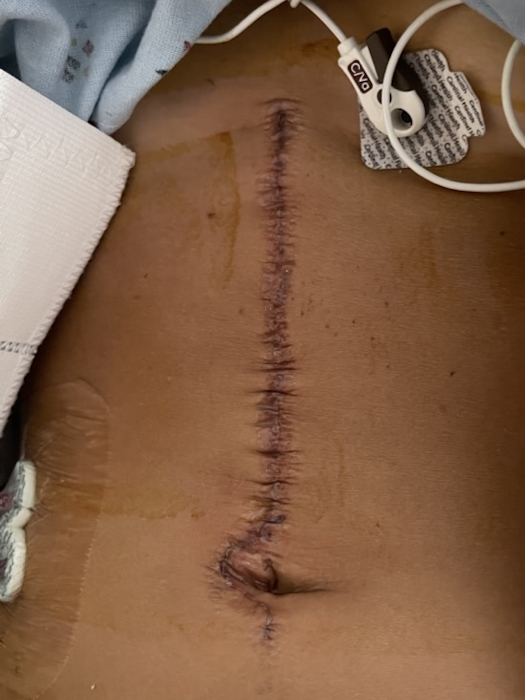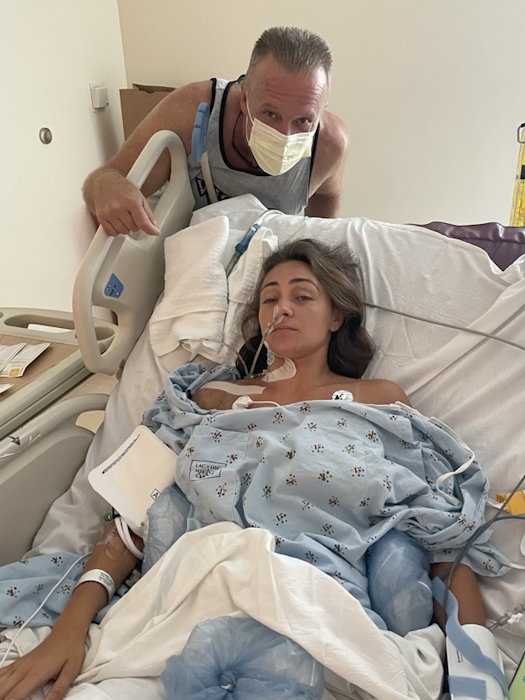Haley’s Advice After Her Pancreatic Neuroendocrine Tumor (pNET) Diagnosis
When Haley found out she had a pancreatic neuroendocrine tumor (pNET) in 2022, it didn’t happen in a dramatic, sudden moment. Instead, it was a slow build-up of digestive issues she couldn’t ignore anymore. She finally told her doctor that she needed to be seen. That request paid off. After an ultrasound revealed a tumor and more testing confirmed it, she received a diagnosis that changed everything.
Interviewed by: Nikki Murphy
Edited by: Katrina Villareal
At first, the news was overwhelming. Haley describes the moment she saw her scan and spotted something bright, white, and round in her abdomen. It was a surreal, gut-wrenching image. Humor became her coping tool, and calling the tumor a “meatball” made the reality a little more bearable.

From the beginning, Haley took an active role in her care. She scoured online test results, Googled medical terms, and advocated for the best surgical team to perform the complex Whipple procedure. This mindset helped her feel empowered, even in moments of uncertainty. She was shocked to learn her pancreatic neuroendocrine tumor wasn’t genetic, especially given her family history of cancer on her mom’s side.
What stands out in Haley’s experience is her focus on mental health and identity. She allows herself to feel everything — grief, fear, gratitude — and takes things day by day. Her humor, spirituality, and self-awareness keep her grounded through it all. Despite her fears about recurrence, she leans into positivity and self-talk to keep her mind strong.
She also became more open about her experience with a pancreatic neuroendocrine tumor, showing off her scar in modeling photos and letting it be a source of pride rather than shame. At first, she kept the diagnosis private and even tried to push a new partner away. But over time, she realized that being vulnerable allowed her to receive support and to heal emotionally.
Navigating life post-surgery hasn’t been easy. Learning how her new body works, especially around eating and digestion, is an ongoing process. She now works with a team of specialists to stay healthy and informed. But above all, Haley emphasizes this: listen to your body, trust your intuition, and don’t be afraid to speak up. Neuroendocrine pancreatic cancer may have disrupted her life, but it hasn’t defined it.
Watch Haley’s full interview to find out more about her story:
- Discover how she turned a shocking cancer diagnosis into a powerful reminder to trust your body.
- As a model, find out how she reclaimed her identity in the process.
- What it means to advocate for yourself in the face of a life-altering diagnosis.
- Learn how Haley reshaped her mindset after losing part of her stomach, pancreas, and gallbladder.
- Name: Haley M.
- Age at Diagnosis:
- 30
- Diagnosis:
- Pancreatic Neuroendocrine Tumor (pNET)
- Symptom:
- Persistent digestive issues
- Treatment:
- Surgery: Pancreaticoduodenectomy (Whipple procedure)
This interview has been edited for clarity and length. This is not medical advice. Please consult with your healthcare provider to make informed treatment decisions.
The views and opinions expressed in this interview do not necessarily reflect those of The Patient Story.

Inspired by Haley's story?
Share your story, too!
Related Stories
Regina J., Lung Neuroendocrine Tumor
Symptoms: Wheezing, back pain, coughing that sometimes produced blood
Treatment: Surgery (partial lung resection)
...
Tabbie V., Pancreatic Neuroendocrine Tumor (pNET)
Symptoms: Abdominal pain, unusual organ "inflammation" feeling when walking, fatigue
Treatments: Chemotherapy (oral and IV), surgeries (Whipple procedure or pancreaticoduodenectomy, liver resection or partial hepatectomy)
...
Hayley O., Pancreatic Neuroendocrine Tumor (pNET)
Symptoms: Severe right-sided pelvic pain, nausea, diarrhea
Treatment: Surgery (pancreaticoduodenectomy or Whipple procedure)
...
Drea E., Gastric Neuroendocrine Tumor (gNET), Stage 3, Grade 1
Symptoms: Fainting spells, fatigue, dizziness, anemia, shortness of breath, absence of menstruation, unexplained weight loss, night sweats
Treatment: Surgery (total gastrectomy with a Roux-en-Y reconstruction)
...










